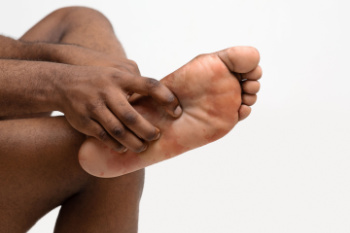
Plantar fasciitis is a condition that results in pain at the bottom of the foot, typically near the heel and arch. This pain often feels like a stabbing or bruising sensation, and may be most intense during the first steps in the morning. For some patients, the discomfort can also occur after standing for long periods of time, or when standing up after sitting for an extended time. Pain from plantar fasciitis may vary in intensity, with severe cases causing significant discomfort during daily activities. Risk factors include having flat feet, high arches, wearing unsupportive footwear, and standing for prolonged periods. Age, specific occupations, and certain pre-existing foot conditions can also contribute to the likelihood of developing plantar fasciitis. A podiatrist can assess your symptoms, identify the underlying causes, and provide effective treatment, such as custom orthotics or other methods to reduce stress on the plantar fascia and alleviate pain. If you have heel pain related to plantar fasciitis, it is suggested that you schedule an appointment with a podiatrist for an exam and treatment.
Plantar fasciitis is a common foot condition that is often caused by a strain injury. If you are experiencing heel pain or symptoms of plantar fasciitis, contact one of our podiatrists from Southwest Podiatry. Our doctors can provide the care you need to keep you pain-free and on your feet.
What Is Plantar Fasciitis?
Plantar fasciitis is one of the most common causes of heel pain. The plantar fascia is a ligament that connects your heel to the front of your foot. When this ligament becomes inflamed, plantar fasciitis is the result. If you have plantar fasciitis you will have a stabbing pain that usually occurs with your first steps in the morning. As the day progresses and you walk around more, this pain will start to disappear, but it will return after long periods of standing or sitting.
What Causes Plantar Fasciitis?
- Excessive running
- Having high arches in your feet
- Other foot issues such as flat feet
- Pregnancy (due to the sudden weight gain)
- Being on your feet very often
There are some risk factors that may make you more likely to develop plantar fasciitis compared to others. The condition most commonly affects adults between the ages of 40 and 60. It also tends to affect people who are obese because the extra pounds result in extra stress being placed on the plantar fascia.
Prevention
- Take good care of your feet – Wear shoes that have good arch support and heel cushioning.
- Maintain a healthy weight
- If you are a runner, alternate running with other sports that won’t cause heel pain
There are a variety of treatment options available for plantar fasciitis along with the pain that accompanies it. Additionally, physical therapy is a very important component in the treatment process. It is important that you meet with your podiatrist to determine which treatment option is best for you.
If you have any questions, please feel free to contact our offices located in Dallas, and Carrollton, TX . We offer the newest diagnostic and treatment technologies for all your foot care needs.
